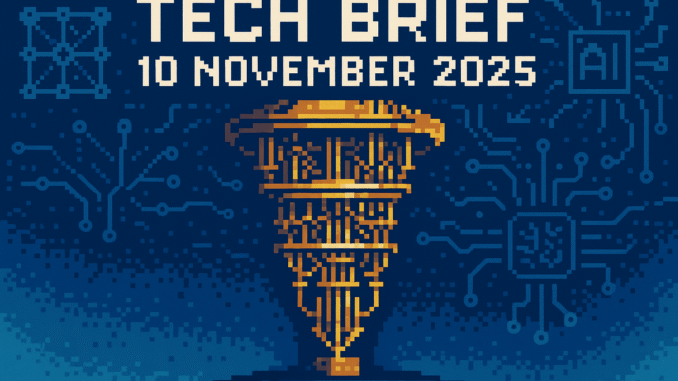
Tech Brief 10 November 2025 brings you a collision of quantum funding, AI headaches, and fresh security alarms. Today’s stories are future-focused yet haunted by decades of digital folk memory. Some things improve, others glitch in new and murkier ways. Microsoft’s original Windows turns forty-two, but you won’t find any rose-tinted retrospectives here.
Missed yesterday’s Tech Brief? Catch up here before diving in.
UK Government Announces £670m Quantum Computing Investment
“Britain intends to take the quantum lead,” declared ministers as they announced £670 million in funding for quantum computing. This is the largest public commitment yet for a technology that, for most, still feels like science fiction or the domain of cryptic university brochures. The funding will support research labs, startups, and commercial pilots. It is the strongest echo of the BBC Micro and Acorn days since anyone loaded 10 PRINT “HELLO” from tape.
The government hopes to foster homegrown quantum computers, but most of the money will go into hardware prototypes, software, and skills training. Policymakers want this sector to spark a new generation of inventors, much as home micros did for 1980s Britain, challenging Silicon Valley in their own way.
Tangible benefits? For now, it is a mix of anticipation and faith in another leap from British soil.
AI-Generated Planning Objections Overwhelm British Councils
What happens when digital empowerment goes sideways? “Objector,” a new online tool, lets UK homeowners auto-generate legal objections to planning proposals using artificial intelligence. Some councils have received hundreds of form-perfect objections from a single street overnight.
Automation was meant to democratise public comment, but the result is a system flooded with AI-generated letters. For every planning officer slogging through identical objections, there is an architect staring down six months of extra red tape.
Technology speeds up processes, but it can just as quickly jam up communities and services. As with old newsgroup flamewars, sheer volume becomes the issue. Who benefits from flooding the system: local voices or the most persistent scripts?
Cisco Finds AI Chatbots Vulnerable to “Jailbreak” Attacks
Security researchers at Cisco have shown that most large language models (LLMs), including those from OpenAI and Google, are vulnerable to “jailbreak” attacks. With enough patience, ordinary users can nudge chatbots into producing content that was supposed to be restricted.
A sequence of clever prompts can bypass built-in defences, making these attacks accessible to anyone, not just specialists. It is digital mischief reminiscent of early modem hacking, just without the disc swapping under school desks.
Vendors are scrambling for fixes. As seen with the AI-generated objections above, systems built to help can be turned against themselves by pranksters or determined users. Security is stuck in a cycle of patch, then chase.
How far can chatbot safeguards go without making them useless? That is a question for future security teams and forum threads.
From the Wayback Machine
On This Day: 1983 – Microsoft Announces Windows at a New York Event
Microsoft first unveiled Windows 1.0 forty-two years ago, touting an affordable graphical interface for IBM-compatible PCs. The minimum spec? Two floppy drives, 192KB RAM, and a willingness to tolerate tiled windows. Overlapping windows would not arrive until Windows 2.0 in 1987. Press reactions were sceptical, since most GUIs were expensive or tied to a single platform.
Early sales were slow, but the vision of accessible, compatible personal computing changed Microsoft’s direction and everyone’s desktop. Compatibility quirks never quite disappeared. Today, Windows’ original bet on open access is still part of our toolkit, even as quantum hardware hovers on tomorrow’s horizon.
Today’s Big Question
What does tech progress really mean when speed and security collide at every turn? Tech Brief 10 November 2025 shows how advances bring both opportunity and hazard, sometimes in the same package. Is faster, smarter better, or just different?
Keep your soldering iron handy and your passwords longer than your first BASIC program. The next leap may look a lot like the last one: awkward, brilliant, unfinished.
Missed yesterday’s Tech Brief? Catch up here

Leave a Reply